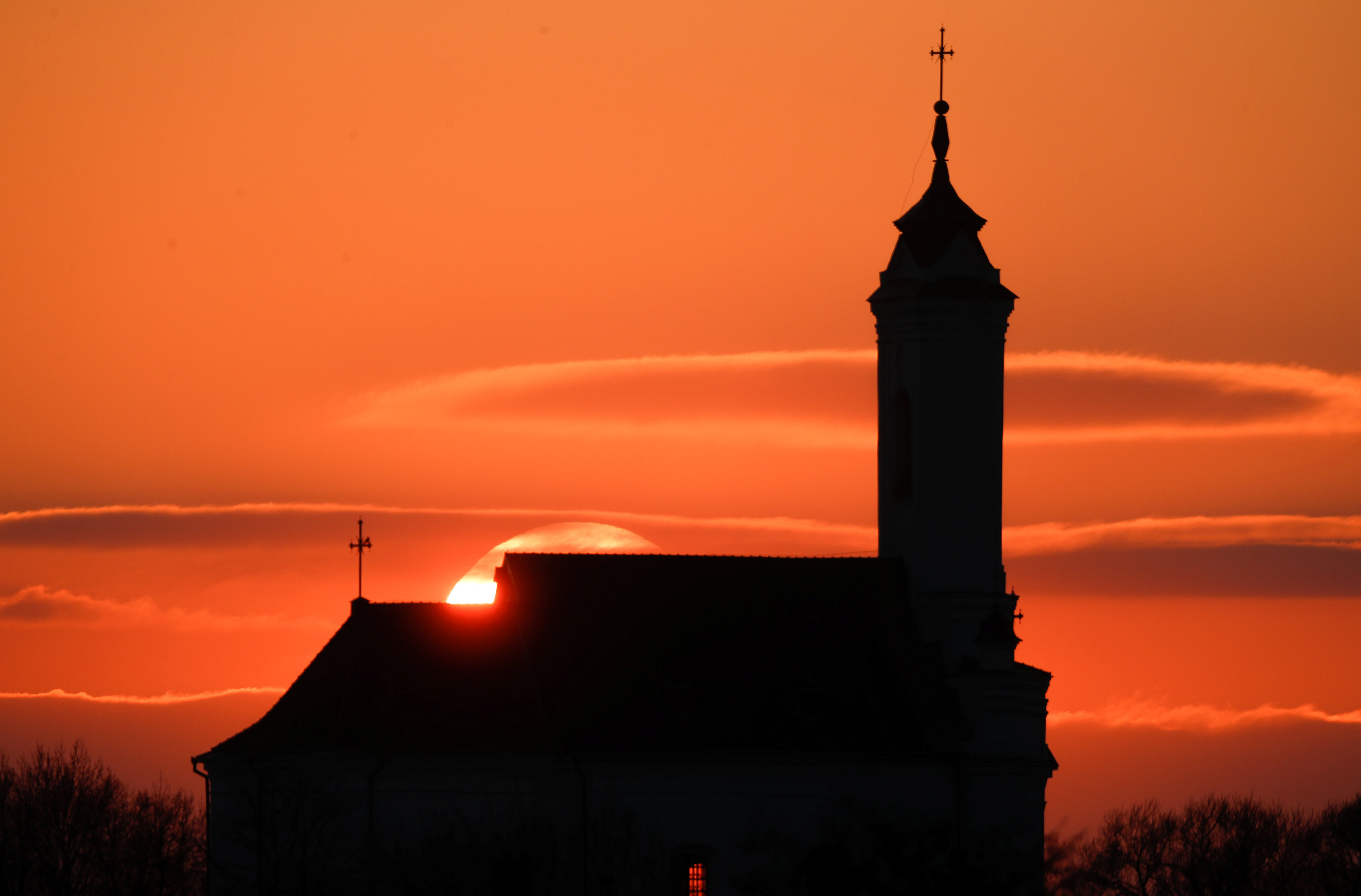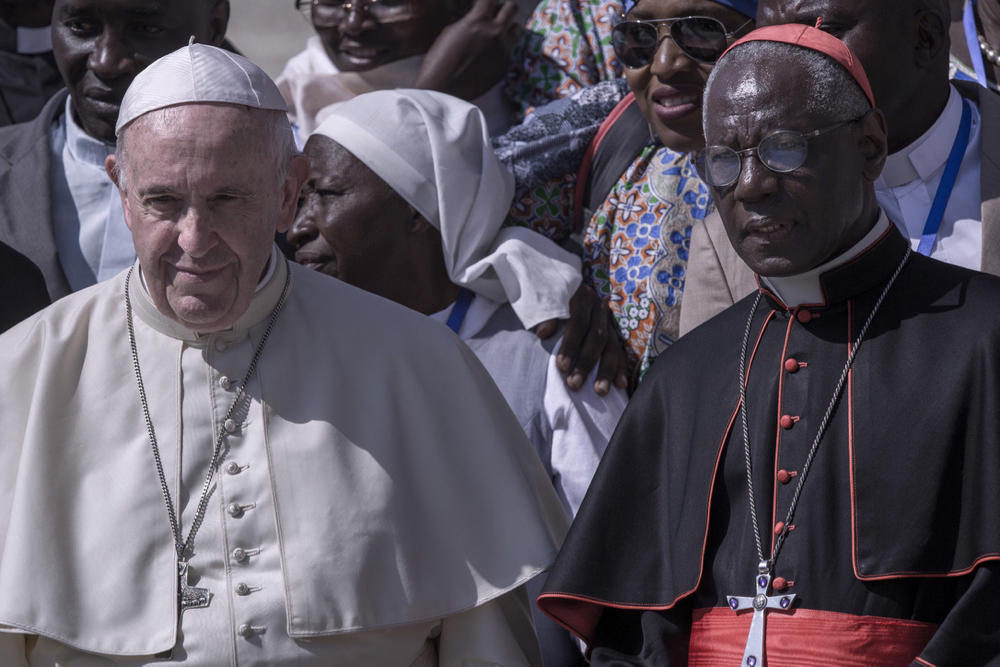Cardinal Robert Sarah has given an interview in which he explains what he believes is at the heart of a sickness that is blighting the whole world. It is a sickness, he says, which has spread across continents but has its roots in Europe.
He was speaking ahead of the publication in September this year of the English translation of his third book-length interview with Nicolas Diat – “The Day is Far Spent” – to the French Catholic magazine La Nef.
He explores the relationship between truth and freedom in contemporary culture, before dwelling on the crisis in the priesthood, and offering a strong defence of priestly celibacy. He comments on the recent book by Frederic Martel, “In the Closet of the Vatican”, which alleges a pervasive gay network in the heart of the Curia.
He links the crisis in the Church to a crisis of faith and explains why, as a “son of Africa”, he feels able to warn the West about the “extreme of self-destructive hate” and the “virulent atheism” that is “a poison from which we are all suffering”.
He ends by pointing a way forward, calling on Christians to “open oases of freedom in the midst of the desert”.
Cardinal Sarah, Prefect of the Congregation for Divine Worship, says that the spiritual crisis that currently blights “the whole world” has its roots in Europe, because Europe has rejected God: “Western people are convinced that receiving is contrary to the dignity of human persons. But civilised man is fundamentally an heir, he receives a history, a culture, a language, a name, a family. This is what distinguishes him from the barbarian. To refuse to be inscribed within a network of dependence, heritage, and filiation condemns us to go back naked into the jungle of a competitive economy left to its own devices. Because he refuses to acknowledge himself as an heir, man is condemned to the hell of liberal globalisation.”
Cardinal Sarah links this idea of the rejection of humanity's inheritance to another that he says is at the root of current malaise: the rejection, in the West, of the idea of fatherhood.
The two rejections, he explains, are intimately bound up with our rejection of God.
“From Him we receive our nature as man and woman.. This is intolerable to modern minds. Gender ideology is a Luciferian refusal to receive a sexual nature from God. Thus some rebel against God and pointlessly mutilate themselves in order to change their sex. But in reality they do not fundamentally change anything of their structure as man or woman. The West refuses to receive, and will accept only what it constructs for itself.”
He continues: “Because it is a gift from God, human nature itself becomes unbearable for western man... This revolt is spiritual at root. It is the revolt of Satan against the gift of grace.”
Sarah takes aim at the UN, with reference to the story of the rich young man who could not bring himself to give his wealth to the poor and follow Christ: “The ‘fundamental values’ promoted by the UN are based on a rejection of God that I compare with the rich young man in the Gospel. God has looked upon the West and has loved it because it has done wonderful things. He invited it to go further, but the West turned back. It preferred the kind of riches that it owed only to itself.”
Africa and Asia are not yet contaminated by gender ideology or the hatred of fatherhood, he acknowledges, but “the Western powers’ neo-colonialist spirit and will to dominate pressure countries to adopt these deadly ideologies.”
The goal of Christian evangelisation, Cardinal Sarah points out, is very different from this “will to dominate”: “The goal of evangelisation is not world domination, but the service of God. Don’t forget that Christ’s victory over the world is…the Cross! It is not our intention to take over the power of the world. Evangelisation is done through the Cross.”
On the question of whether Christianity should “permeate” society, Sarah says that, while “a society permeated by the Faith, the Gospel, and natural law is something desirable”, “the more profound goal of the Church is not to construct a particular model society. The Church has received the mandate to proclaim salvation, which is a supernatural reality. A just society disposes souls to receive the gift of God, but it cannot give salvation.”
“A society inspired by the Gospel protects the weak against the consequences of sin,” he adds. “Conversely, a society cut off from God quickly turns into a dictatorship and becomes a structure of sin.”
Asked whether we have passed “from a society dominated by the quest for truth to a society dominated by the quest for freedom”, the cardinal says this is a false opposition.
“It is not correct to speak of a ‘balance’ between two poles: truth and freedom. In fact, this manner of speaking presupposes that these realities are external to and in opposition to one another. Freedom is essentially a tending toward what is good and true. The truth is meant to be known and freely embraced. A freedom that is not itself oriented and guided by truth is nonsensical … to accept the truth is the most beautiful act of freedom that man can perform.”
The crisis in the priesthood, Sarah traces back to the taking away of the priest’s identity.
“We have made priests believe that they need to be efficient men. But a priest is fundamentally the continuation of Christ’s presence among us. He should not be defined by what he does, but by what he is: 'ipse Christus', Christ Himself. The discovery of many cases of sexual abuse against minors reveals a profound spiritual crisis, a grave, deep, and tragic rupture between the priest and Christ.”
“We, the bishops, bear a large share of responsibility for the crisis of the priesthood,” Sarah admits. “Have we been fathers to them? Have we listened to them, understood and guided them? Have we given them an example? Too often dioceses are transformed into administrative structures.”
He says: “Celibacy is a concrete means that permits us to live this mystery of the Cross in our lives. Celibacy inscribes the Cross in our very flesh. That is why celibacy is intolerable for the modern world. Celibacy is a scandal for modern people, because the Cross is a scandal.”
Asked about the recently published book “In the Closet of the Vatican”, by Frédéric Martel, that says there are a large number of homosexual prelates in the Vatican, and lends credibility to claims of a powerful gay network there, Sarah says: “Today the Church is living with Christ through the outrages of the Passion. The sins of her members come back to her like strikes on the face.
“Yes, there are sinners. Yes, there are unfaithful priests, bishops, and even cardinals who fail to observe chastity,” he accepts. “But also, and this is also very grave, they fail to hold fast to doctrinal truth! They disorient the Christian faithful by their confusing and ambiguous language. They adulterate and falsify the Word of God, willing to twist and bend it to gain the world’s approval. They are the Judas Iscariots of our time.”
“Sin should not surprise us,” he says, but “we must have the courage to call it by name. We must not be afraid to rediscover the methods of spiritual combat: prayer, penance, and fasting.”
“There is no ‘homosexual problem’ in the Church,” he argues. “There is a problem of sins and infidelity. Let us not perpetuate the vocabulary of LGBT ideology. Homosexuality does not define the identity of persons. It describes certain deviant, sinful, and perverse acts. For these acts, as for other sins, the remedies are known. We must return to Christ, and allow him to convert us.”
On the crisis in the Church, he says that some want the Church to “speak the language of the media. They want to make it popular. They urge it not to speak about God, but to throw itself body and soul into social problems: migration, ecology, dialogue, the culture of encounter, the struggle against poverty, for justice and peace”.
These are “important and vital questions before which the Church cannot shut her eyes” he acknowledges. But “a Church such as this is of interest to no one. The Church is only of interest because she allows us to encounter Jesus.”
What the Church needs, he says, is “a profound, radical reform that must begin by a reform of the life of her priests … Their whole being and all their activities must be put to the service of sanctity.”
“I am sure that it is the saints who change history. The structures follow afterwards,” he insists.
Western civilisation, he says, “is passing at present through a mortal crisis. It has reached the extreme of self-destructive hate”. “As a bishop, it is my duty to warn the West!” he exclaims, before expressing a cri de coeur, from someone who acknowledges his debt to missionaries who came to Africa from the West:
“The West is blinded by science, technology, and the thirst for riches. The lure of riches, which liberalism spreads in hearts, has sedated the peoples. At the same time, the silent tragedy of abortion and euthanasia continue and pornography and gender ideology destroy children and adolescents. We are accustomed to barbarism. It doesn’t even surprise us anymore! I want to raise a cry of alarm, which is also a cry of love. I do so with a heart full of filial gratitude for the Western missionaries who died in my land of Africa and who communicated to me the precious gift of faith in Jesus Christ. I want to follow their lead and receive their inheritance!”
Pointing to the “threat posed by Islamism”, he says: “Muslims despise the atheistic West. They take refuge in Islamism as a rejection of the consumer society that is offered to them as a religion. Can the West present them the Faith in a clear way? For that it will have to rediscover its Christian roots and identity.”
Sarah paints a vivid picture of near-catastrophe, but he still holds out hope, and shows how it is possible to live the Christian life in these circumstances: “I see families, monasteries, and parishes that are like oases in the middle of a desert. It is from these oases of faith, liturgy, beauty, and silence that the West will be reborn,” he assures us. “I call upon Christians to open oases of freedom in the midst the desert created by rampant profiteering. We must create places where the air is breathable, or simply where the Christian life is possible. Our communities must put God in the centre. Amidst the avalanche of lies, we must be able to find places where truth is not only explained but experienced. In a word, we must live the Gospel: not merely thinking about it as a utopia, but living it in a concrete way. The Faith is like a fire, but it has to be burning in order to be transmitted to others. Watch over this sacred fire! Let it be your warmth in the heart of this winter of the West.”
There is a light shining in this darkness, Cardinal Sarah says, waiting for us to find Him: “He who said ‘I am the Way, the Truth, and the Life’ ” (Jn 14:6).
Translation from the French of Cardinal Sarah's words by Zachary Thomas



 Loading ...
Loading ...